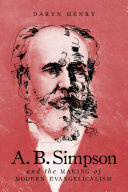
A shrewd synthesizer, gifted popularizer, and inspiring founder of the Christian and Missionary Alliance movement, A.B. Simpson (1843-1919) was enmeshed in the most crucial threads of evangelical Christianity at the turn of the twentieth century. Daryn Henry presents Simpson's life and ministry as a vivid, fascinating, and paradigmatic study in evangelical religious culture, during a time when the conservative wing of the movement has often been overlooked. Simpson's ministry, Henry explains, fused the classic evangelical emphasis on revivalist conversion with the intensification of that sensibility in the quest for the deeper Christian life of holiness. Recovering the practice of divine healing, Simpson emphasized a dynamically empowered and supernaturally animated Christianity that would spill over into nascent Pentecostalism. His encouragement of cross-cultural missions was part of a trend that unleashed the dramatic rise of world Christianity across the Global South. All the while, his Biblical literalism, antagonism to modernist theology, campaigns against evolution, and views on premillennialism, Biblical prophecy, and the role of Israel in the end times made Simpson a precursor of the fundamentalist melees of subsequent decades. From his upbringing in rural Canada and confessional Scottish Presbyterianism, Simpson journeyed into the heart of American evangelicalism revolving around his base in New York City. Against most previous writing on Simpson, Henry's biography presents both continuities and discontinuities in the development of modern interdenominational evangelicalism out of the denominational evangelicalism of the nineteenth century.